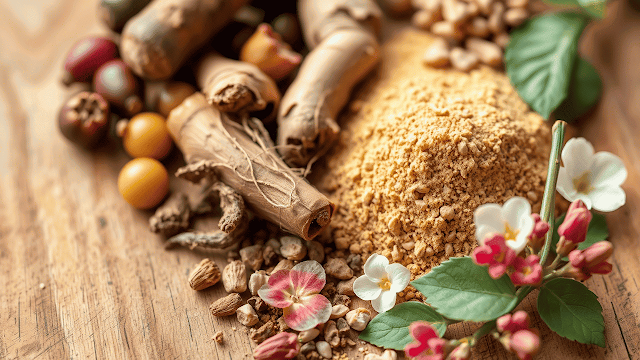Hormone Balance Herbs: Natural Guide to Restoring Equilibrium
 |
| woman meditating |
Understanding the Hormonal Landscape: A Delicate Ecosystem
Hormones are the chemical messengers that orchestrate virtually every physiological process in the body, from metabolism and mood to reproduction and growth. Produced by the endocrine system – a network of glands including the thyroid, adrenals, pituitary, and ovaries/testes – these potent substances travel through the bloodstream, delivering instructions to cells and tissues. When this intricate system is functioning optimally, we experience a state of vibrant health and well-being. However, when hormones become imbalanced – whether due to stress, poor diet, environmental toxins, or other factors – the consequences can be far-reaching.
Think of your hormonal system as a finely tuned orchestra. Each instrument (gland) plays a specific role, and the conductor (the brain) ensures that they all work in harmony. If one instrument is out of tune, or if the conductor loses control, the resulting sound can be discordant and unsettling. Similarly, when hormones are imbalanced, the body’s internal symphony is disrupted, leading to a cascade of symptoms.
Common hormonal imbalances include:
- Estrogen Dominance: An excess of estrogen relative to progesterone.
- Thyroid Dysfunction: Underactive or overactive thyroid gland.
- Adrenal Fatigue: Chronic stress leads to depleted adrenal hormones.
- PCOS (Polycystic Ovary Syndrome): Hormonal disorder affecting women of reproductive age.
The Herbal Arsenal: Key Herbs for Hormone Balance
1. Vitex Chasteberry (Vitex agnus-castus):
Often considered the “go-to” herb for female hormonal imbalances, Vitex supports healthy progesterone levels, helping to regulate menstrual cycles, alleviate PMS symptoms, and improve fertility.
2. Ashwagandha (Withania somnifera):
A powerful adaptogen that helps the body adapt to stress, reducing cortisol levels and supporting adrenal function. It can also improve thyroid function and enhance energy levels.
3. Maca Root (Lepidium meyenii):
Another adaptogen, Maca supports hormonal balance in both men and women, boosting energy, libido, and mood. It’s particularly beneficial for women experiencing menopause.
4. Shatavari (Asparagus racemosus):
A traditional Ayurvedic herb revered for its rejuvenating properties, Shatavari supports female reproductive health, balances hormones, and promotes vitality.
5. Red Clover (Trifolium pratense):
Rich in phytoestrogens, Red Clover can help alleviate menopausal symptoms like hot flashes and night sweats.
 |
| hormone-balancing herbs |
6. Black Cohosh (Actaea racemosa):
Another herb traditionally used for menopause, Black Cohosh can help reduce hot flashes, improve sleep, and enhance mood.
7. Dong Quai (Angelica sinensis):
A traditional Chinese medicine herb used to regulate menstrual cycles, alleviate PMS symptoms, and support overall female reproductive health.
8. Chaste Tree (Vitex agnus-castus):
(Repeated for emphasis, as it's a cornerstone herb) Supports healthy progesterone levels and menstrual cycle regularity.
Beyond the Herbs: Lifestyle Factors for Hormonal Harmony
While herbs can be incredibly effective, they’re most potent when combined with a holistic lifestyle approach.
- Diet: Focus on a whole-food diet rich in fruits, vegetables, healthy fats, and lean protein. Limit processed foods, sugar, and caffeine.
- Stress Management: Practice stress-reducing techniques like yoga, meditation, deep breathing, or spending time in nature.
- Sleep: Aim for 7-9 hours of quality sleep each night.
- Exercise: Engage in regular physical activity, but avoid overtraining.
- Gut Health: Support a healthy gut microbiome with probiotic-rich foods and prebiotics.
- Detoxification: Minimize exposure to endocrine disruptors – chemicals found in plastics, pesticides, and personal care products – and support liver detoxification.
Dosage & Safety Considerations
Before starting any herbal regimen, it’s crucial to consult with a qualified healthcare practitioner, especially if you have underlying health conditions or are taking medications. Start low and go slow, paying attention to your body’s response. Choose high-quality, organic herbs from reputable sources. Be aware of potential side effects and discontinue use if you experience any adverse reactions.
Resources for Further Exploration:
- National Center for Complementary and Integrative Health (NCCIH):
- American Botanical Council:
- Mount Sinai Health System - Herbs for Hormone Balance:
A Final Thought
Reclaiming hormonal balance isn’t about chasing perfection; it’s about cultivating a deeper understanding of your body’s needs and honoring its innate wisdom. It’s a journey of self-discovery, a commitment to nourishing your well-being from the inside out. Embrace the power of nature, listen to your body’s signals, and allow the gentle guidance of hormone-balancing herbs to lead you back to a state of vibrant equilibrium. Remember, you are not simply a collection of hormones; you are a complex, resilient, and beautifully intricate being, capable of thriving in harmony with yourself and the world around you. It’s a process, not a destination, and every small step you take towards balance is a victory worth celebrating.









